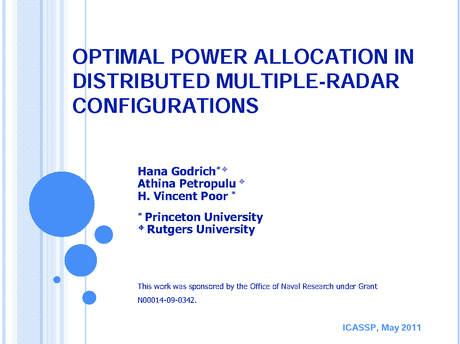OPTIMAL POWER ALLOCATION IN DISTRIBUTED MULTIPLE-RADAR CONFIGURATIONS
Sensor Networks
Presented by: Hana Godrich, Author(s): Hana Godrich, Princeton University / Rutgers University, United States; Athina Petropulu, Rutgers University, United States; H. Vincent Poor, Princeton University, United States
A performance driven power allocation scheme is proposed for target localization in widely distributed multiple-radar architectures. For a total transmitted power goal, power may be uniformly allocated among all transmit stations. This will result with a specific target location estimation mean-square error (MSE) that may be evaluated using the Cramer-Rao bound (CRB). However, in the case of target tracking, where previous knowledge of the system exists, uniform allocation might not be the most energy efficient method. In this paper, the following optimization problem is considered: find an optimal power allocation among the transmit radar stations, such that the total transmitted energy is minimized for a given performance objective. To address this problem, the Karush-Kuhn-Tucker (KKT) conditions for the resulting nonconvex optimization problem are formulated and a set of parallel, non-overlapping, optimization problems is derived. This approach supports distributed processing of the optimal power allocation. Additionally, the analytical expressions provide imperative understanding of the relation between the system characteristics and the manner in which power is allocated. It is shown that uniform power allocation is not in general optimal and that considerable power savings may be attained through power adaptation.
Lecture Information
| Recorded: | 2011-05-26 16:15 - 16:35, Club E |
|---|---|
| Added: | 22. 6. 2011 00:20 |
| Number of views: | 15 |
| Video resolution: | 1024x576 px, 512x288 px |
| Video length: | 0:22:29 |
| Audio track: | MP3 [7.61 MB], 0:22:29 |






Comments